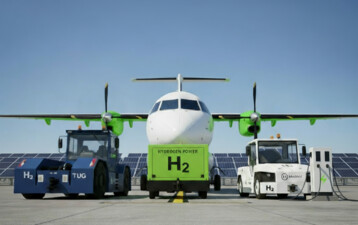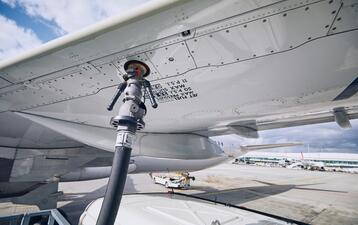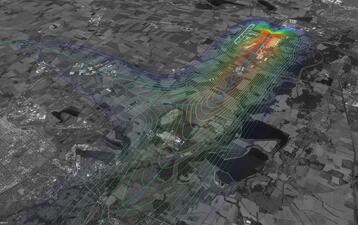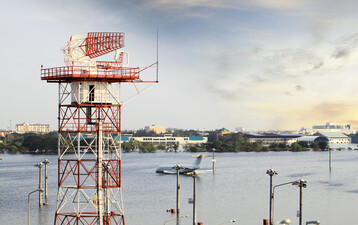NEW
Impact of Zero-Emission Aviation at Airports
Aerodromes play a crucial role in the transition towards emission-free aviation. By implementing electric or hydrogen-powered ground support equipment (GSE), harvesting renewable energy on site or investing in low-emisson infrastructure, airports can make a significant contribution to reducing CO₂ emissions and act as pioneers for climate-neutral mobility.
This intensive three-day training is designed for airport operators, ground service providers, airlines, ATC/ANSPs, equipment suppliers, construction companies, government and regulatory bodies, as well as other stakeholders such as local transportation companies involved in landside access. It offers a comprehensive overview into infrastructural, equipment-related and operations-focused solutions enabling the transition toward net-zero emissions at airports. The goal is to impart current knowledge, spark curiosity, and enable participants to actively shape sustainable developments within their organizations.
The course begins with the fundamentals of zero-emission aviation concepts, covering international standards, recommendations and trends (ICAO), supranational regulations (e.g. AFIR, RED II) and selected national legislative actions relevant to each stakeholder group. A strong emphasis is placed on practical applications such as implementation of low/zero emission technologies and infrastructures at airports, integration into ground operations, and sustainable manufacturing practices. The participants will learn the principles of developing a Concept of Operations (CONOPS) for the implementation of new equipment within an existing airport environment, where also future innovations in vehicle technology are addressed.
Participants will then explore green technologies like electric and hydrogen-powered systems, including the necessary infrastructure, charging/fueling processes, and environmental standards. Urban and Regional Air Mobility (UAM/RAM), along with the planning and operation of vertiports, offer a forward-looking perspective on emerging modes of air transport that will impact all involved sectors.
Another key focus is the integration of renewable energy into airport operations. Topics include photovoltaic systems, wind energy and other renewable energy solutions, along with regulatory frameworks, operational and safety-related challenges.
This training delivers a practical, strategically relevant understanding of the future of climate-friendly aviation - directly linked to today’s challenges and opportunities.
Course Details
Location:BerlinLanguage:English
Date:08.06. - 10.06.2026
Duration:3 days
Provider:airsight GmbH
Course Fee
For courses in Berlin:
All customers will be charged 19% VAT. For more information please see our About Taxes page.
The final price will be shown on your invoice.
Please note: If you want to register several particpants from your company but need a single invoice for each, please register each of them seperately.
Course Content
Sustainability in Aviation
- Overview and Fundamentals of green technologies
- Sustainability at Airports
- Sustainability on the manufacturer side
- International initiatives
Implementation of Zero-Emissions Technologies at Airports
- Overview Aircrafts and Ground vehicles
- Full-electric solutions for Airports
- Hydrogen and hybrid solutions for Airports
- Infrastructure and charging/fuelling process
- Eco Benchmarks
- Transition and Implementation
Advanced Air Mobility AAM
- Urban Air Mobility – UAM
- Regional Air Mobility – RAM
- Vertiports
Legal Framework
- On international base – ICAO
- Supranational - EU and EASA
- Selected national legislative activities (EU-based)
CONOPS Development
- Operational aspects
- Equipment and Infrastructure
- Barriers, Challenges and Regulations
- Implementation and roadmapping
Cost Perspective
- Green Financing
- Potential Savings
Renewable Energy
- Renewable energy demand
- Renewable energy sources & potential
- Aeronautical implications (compliance, safety, operations)
Trainer
Christoph Struempfel-Seifert, M.Sc.
Head of airsight’s Sustainable Aviation department
Mr Struempfel-Seifert is an expert for sustainable aviation and is responsible for all project tasks related to sustainable aviation and environmental protection at airports. Furthermore, he is an appreciated trainer, sharing his knowledge and practical experience with other national and international aviation experts.
After graduating as Master of Science in Aeronautics and Astronautics from the Technical University of Berlin, he worked as a research assistant and lecturer at the Chair of Flight Guidance and Air Transport at the TU Berlin. In his scientific career, he focused on modelling aircraft noise and emissions, UAS noise measurements and calculation as well as the optimization of flight procedures with respect to environmental and eco-efficiency targets.
For airsight, he has conducted several environmental assessments, noise and emissions studies for various airports in Germany, Luxembourg, United Arab Emirates, Romania and the Philippines. As a recognized SME for aircraft noise modeling, he has extensive experience with the FAA's Aviation Environmental Design Tool (AEDT).
A second major focus of his work is to support international airports on their decarbonization journey with detailed studies on renewable energy, in particular the implementation of solar energy systems, including Singapore-Changi, Berlin, Cologne, Düsseldorf, Stuttgart and various other airports. His team is helping airports meet the challenges of the future through new, sustainable technologies, such as sustainable aircraft taxiing and e-GSE implementation.
Ignacio Puebla Millán, M.Sc.
Mr. Ignacio Puebla Millán is an aerospace engineer specializing in sustainable aviation with experience in national and international projects. He studied Aeronautics and Astronautics at the Technical University of Madrid and Munich and completed a master’s degree with a thesis focused on airport planning at Politecnico di Milano in Milan.
In his current role at airsight, Ignacio supports and leads various sustainability and airport planning projects, leveraging his international experience with clients in Singapore, Toronto, Dubai, Cologne, Düsseldorf, Berlin, and the Philippines. His areas of expertise include noise assessment, glint and glare analysis, sustainable taxiing, decarbonization and aerodrome design.
He is also experienced in using the FAA's Aviation Environmental Design Tool (AEDT) for conducting noise assessments on a global scale.
Felix Gross, M. Sc.
Mr. Felix Gross is an aerospace engineer specializing in the design of innovative aircraft concepts and airside airport planning. His particular expertise lies in the integration of emerging technologies—especially electric vertical take-off and landing aircraft (eVTOLs)—into existing airspace structures and infrastructures such as vertiports. He places strong emphasis on sustainable propulsion systems, including fully electric, hydrogen-based, and hybrid technologies.
He completed his master’s thesis in collaboration with the German Aerospace Center (DLR), where he developed a practical evaluation model for the technical and operational integration of vertiports in urban environments.
In his current role at airsight, Felix supports international airports in their efforts to decarbonize. He conducts in-depth studies on the implementation of renewable energy systems, particularly solar power installations—at airports such as Singapore Changi, Berlin, Cologne, Düsseldorf, and Stuttgart. Additionally, he is pursuing the path of aviation auditor, aligned with the regulatory frameworks of EASA, ICAO, and IATA.
Through his work, Felix aims to bridge technological innovation with ecological responsibility—for example, by promoting sustainable taxiing and the deployment of electric ground support equipment (e-GSE)—actively contributing to a greener, future-ready aviation sector.
Target Group
- airport operators
- ground service providers
- Airlines
- ATC/ANSPs
- equipment suppliers
- construction companies and project developer
- government and regulatory bodies, as well as
- other stakeholders such as local transportation companies
Course Location
Participants are responsible for making their own travel arrangements. The accommodation and travel costs are at the charge of the participants. Please note that airsight does not perform any travel and hotel bookings for the participants. Rooms can however be booked directly by the participants by contacting the hotel. We would like to point out that from January 2025 a City Tax of 7.5% will be imposed on overnight stays for business and professional purposes in Berlin.
The course fee includes the registration, training material and examination. For non-virtual courses, coffee breaks and business lunch are also included.
Organisational Details
The course hours are scheduled as follows:
first training day: 10:00 am - 5:00 pm
mid-training days: 9:00 am - 5:00 pm
last training day: 8:00 am - 4:00 pm
Coffee breaks and business lunch are included in the course fee. At the end of the course, all participants will receive an airsight certificate based on EASA training regulations, which is highly recognised throughout the aviation industry.
About airsight Training
airsight Training course quality
airsight operates an ISO 9001 certified Quality Management System and pursues the objective to provide high quality services that fully meet the clients’ needs.
Course Details
Location:In-houseLanguage:German / English
Duration:3 days
Provider:airsight GmbH
Course Content
Sustainability in Aviation
- Overview and Fundamentals of green technologies
- Sustainability at Airports
- Sustainability on the manufacturer side
- International initiatives
Implementation of Zero-Emissions Technologies at Airports
- Overview Aircrafts and Ground vehicles
- Full-electric solutions for Airports
- Hydrogen and hybrid solutions for Airports
- Infrastructure and charging/fuelling process
- Eco Benchmarks
- Transition and Implementation
Advanced Air Mobility AAM
- Urban Air Mobility – UAM
- Regional Air Mobility – RAM
- Vertiports
Legal Framework
- On international base – ICAO
- Supranational - EU and EASA
- Selected national legislative activities (EU-based)
CONOPS Development
- Operational aspects
- Equipment and Infrastructure
- Barriers, Challenges and Regulations
- Implementation and roadmapping
Cost Perspective
- Green Financing
- Potential Savings
Renewable Energy
- Renewable energy demand
- Renewable energy sources & potential
- Aeronautical implications (compliance, safety, operations)
Trainer
Christoph Struempfel-Seifert, M.Sc.
Head of airsight’s Sustainable Aviation department
Mr Struempfel-Seifert is an expert for sustainable aviation and is responsible for all project tasks related to sustainable aviation and environmental protection at airports. Furthermore, he is an appreciated trainer, sharing his knowledge and practical experience with other national and international aviation experts.
After graduating as Master of Science in Aeronautics and Astronautics from the Technical University of Berlin, he worked as a research assistant and lecturer at the Chair of Flight Guidance and Air Transport at the TU Berlin. In his scientific career, he focused on modelling aircraft noise and emissions, UAS noise measurements and calculation as well as the optimization of flight procedures with respect to environmental and eco-efficiency targets.
For airsight, he has conducted several environmental assessments, noise and emissions studies for various airports in Germany, Luxembourg, United Arab Emirates, Romania and the Philippines. As a recognized SME for aircraft noise modeling, he has extensive experience with the FAA's Aviation Environmental Design Tool (AEDT).
A second major focus of his work is to support international airports on their decarbonization journey with detailed studies on renewable energy, in particular the implementation of solar energy systems, including Singapore-Changi, Berlin, Cologne, Düsseldorf, Stuttgart and various other airports. His team is helping airports meet the challenges of the future through new, sustainable technologies, such as sustainable aircraft taxiing and e-GSE implementation.
Ignacio Puebla Millán, M.Sc.
Mr. Ignacio Puebla Millán is an aerospace engineer specializing in sustainable aviation with experience in national and international projects. He studied Aeronautics and Astronautics at the Technical University of Madrid and Munich and completed a master’s degree with a thesis focused on airport planning at Politecnico di Milano in Milan.
In his current role at airsight, Ignacio supports and leads various sustainability and airport planning projects, leveraging his international experience with clients in Singapore, Toronto, Dubai, Cologne, Düsseldorf, Berlin, and the Philippines. His areas of expertise include noise assessment, glint and glare analysis, sustainable taxiing, decarbonization and aerodrome design.
He is also experienced in using the FAA's Aviation Environmental Design Tool (AEDT) for conducting noise assessments on a global scale.
Felix Gross, M. Sc.
Mr. Felix Gross is an aerospace engineer specializing in the design of innovative aircraft concepts and airside airport planning. His particular expertise lies in the integration of emerging technologies—especially electric vertical take-off and landing aircraft (eVTOLs)—into existing airspace structures and infrastructures such as vertiports. He places strong emphasis on sustainable propulsion systems, including fully electric, hydrogen-based, and hybrid technologies.
He completed his master’s thesis in collaboration with the German Aerospace Center (DLR), where he developed a practical evaluation model for the technical and operational integration of vertiports in urban environments.
In his current role at airsight, Felix supports international airports in their efforts to decarbonize. He conducts in-depth studies on the implementation of renewable energy systems, particularly solar power installations—at airports such as Singapore Changi, Berlin, Cologne, Düsseldorf, and Stuttgart. Additionally, he is pursuing the path of aviation auditor, aligned with the regulatory frameworks of EASA, ICAO, and IATA.
Through his work, Felix aims to bridge technological innovation with ecological responsibility—for example, by promoting sustainable taxiing and the deployment of electric ground support equipment (e-GSE)—actively contributing to a greener, future-ready aviation sector.
Target Group
- airport operators
- ground service providers
- Airlines
- ATC/ANSPs
- equipment suppliers
- construction companies and project developer
- government and regulatory bodies, as well as
- other stakeholders such as local transportation companies
Organisational Details
airsight offers this training course on request, worldwide. At the end of the course, all participants will receive an airsight certificate based on EASA training regulations, which is highly recognised throughout the aviation industry.
About airsight Training
airsight Training course quality
airsight operates an ISO 9001 certified Quality Management System and pursues the objective to provide high quality services that fully meet the clients’ needs.


 Training 5 or more people? Ask for an In-house course at your premises or online!
Training 5 or more people? Ask for an In-house course at your premises or online!





